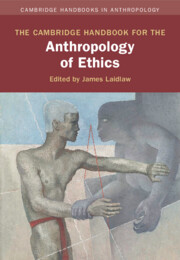Book contents
- The Cambridge Handbook for the Anthropology of Ethics
- Cambridge Handbooks in Anthropology
- The Cambridge Handbook for the Anthropology of Ethics
- Copyright page
- Contents
- Contributors
- 1 Introduction
- Part I Intellectual Sources and Disciplinary Engagements
- Part II Aspects of Ethical Agency
- Part III Media and Modes of Ethical Practice
- Part IV Intimate and Everyday Life
- Part V Institutional Life
- 29 Modern Capitalism and Ethical Plurality
- 30 The Ethics of Commerce and Trade
- 31 Activism and Political Organization
- 32 Philanthropy
- 33 Science
- 34 Communist Morality under Socialism
- Index
- References
30 - The Ethics of Commerce and Trade
from Part V - Institutional Life
Published online by Cambridge University Press: 11 May 2023
- The Cambridge Handbook for the Anthropology of Ethics
- Cambridge Handbooks in Anthropology
- The Cambridge Handbook for the Anthropology of Ethics
- Copyright page
- Contents
- Contributors
- 1 Introduction
- Part I Intellectual Sources and Disciplinary Engagements
- Part II Aspects of Ethical Agency
- Part III Media and Modes of Ethical Practice
- Part IV Intimate and Everyday Life
- Part V Institutional Life
- 29 Modern Capitalism and Ethical Plurality
- 30 The Ethics of Commerce and Trade
- 31 Activism and Political Organization
- 32 Philanthropy
- 33 Science
- 34 Communist Morality under Socialism
- Index
- References
Summary
This chapter explores the insights that ethnography offers into understanding the interface between commerce and ethics. The first section argues that the anthropology of exchange, in which commerce is seen as a distinctive sphere of transaction, risks truncating our understanding of the relationship between commerce and ethics. The second section explores the relationships between trade, violence, and state power, noting that merchants often articulate ethical ideals as they negotiate these relationships. The third section discusses scholarship on long-distance trading networks and trust, and suggests that the category of ethics is most helpful when it is used to describe not the basis of trust but the ways in which merchants manage and confront mistrust: for example, how they conceive of tensions between sentiment and self-interest. The final section identifies four areas stimulated by attention to the ethical dimensions of commerce: the diverse notions of reputation and personhood that animate the conduct of trade; the ways in which merchants conceive of the relationship between commerce and systems of morality and negotiate moral dilemmas; the way that commerce is informed by vernacular notions of value, abundance, and prosperity; and the forms of self-making that traders pursue through commerce.
- Type
- Chapter
- Information
- The Cambridge Handbook for the Anthropology of Ethics , pp. 760 - 790Publisher: Cambridge University PressPrint publication year: 2023

